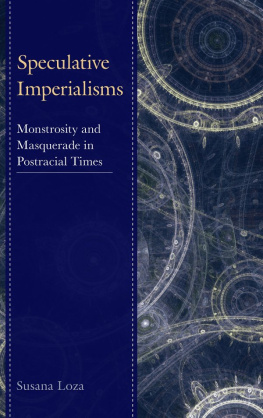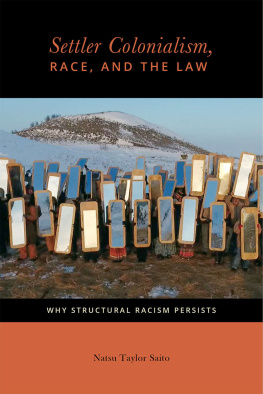Speculative Imperialisms
Speculative Imperialisms
Monstrosity and Masquerade in Postracial Times
Susana Loza
Lexington Books
Lanham Boulder New York London
Published by Lexington Books
An imprint of The Rowman & Littlefield Publishing Group, Inc.
4501 Forbes Boulevard, Suite 200, Lanham, Maryland 20706
www.rowman.com
Unit A, Whitacre Mews, 26-34 Stannary Street, London SE11 4AB
Copyright 2018 by Lexington Books
All rights reserved . No part of this book may be reproduced in any form or by any electronic or mechanical means, including information storage and retrieval systems, without written permission from the publisher, except by a reviewer who may quote passages in a review.
British Library Cataloguing in Publication Information Available
Library of Congress Cataloging-in-Publication Data Available
ISBN 978-1-4985-0796-7 (cloth: alk. paper)
ISBN 978-1-4985-0797-4 (electronic)
 The paper used in this publication meets the minimum requirements of American National Standard for Information SciencesPermanence of Paper for Printed Library Materials, ANSI/NISO Z39.48-1992.
The paper used in this publication meets the minimum requirements of American National Standard for Information SciencesPermanence of Paper for Printed Library Materials, ANSI/NISO Z39.48-1992.
Printed in the United States of America
In memory of my beloved brother, Antonio Loza Jr. (19752014)
Acknowledgments
This book has been my companion for five years. It is just a few months younger than my child. They gestated together. They brought wonder and chaos into my world. And when my brother died three years ago, they kept me moving forward. They gave me purpose.
I owe an enormous debt of gratitude to many people for their generosity and assistance. First and foremost, my parents for their unstinting support of what they viewed as a skeptical enterprise. Without their endless hours of childcare, I would never have had the time to conceive, research, and write this book.
Writing and research can be tremendously lonely activities. The support I received from friends and colleagues ensured that I never felt alone as I was working on this book. Thank you Michele for providing beer, encouraging dancing, and talking through my inchoate ideas. Your emotional, physical, and intellectual sustenance was essential to the completion of this project. Thank you Alicia and DHM for abetting my rants about Planet of the Apes , for debating Doctor Who , for unpacking District 9 , for always having faith in my writing and me. Thank you Katherine for inviting me to present my work, for your invaluable feedback, and for commiserating about how to balance life and work without cloning oneself. Thank you Sonya for sharing your sharp SF insights and always pushing my analysis. Thank you Tom for being as obsessed with SF as I am and always responding with just the right gif. Thank you Dawn for being the loveliest friend, sweetest booster, and fiercest thinker. Thank you Caren and Tim former mentors turned friends, for championing my writing and me. Thank you Marina and Diem-My for taking a chance on Playing Alien. Thank you Wilson, Tina, Chris, and Jennifer for insisting that we are scholars. Thank you to Uditi, Mei-Ann, Djola, Omar, Branwen, Constance, and kara for reminding me that we are always more than our work. We are laughter, joy, poetry, and dance.
I have been fortunate to have the opportunity to present much of this research at academic conferences. I thank the organizers of those conferences and the audience members of the panels that I presented on. I am deeply appreciative of the grants that I received from Hampshire College that made it possible for me to conduct and present this research. Last but not least, I want to thank my students. Teaching has given me the opportunity to flesh out the ideas in this book. I am extremely appreciative of their willingness to grapple with difficult subject matter. While the ideas in this book have infiltrated many of the courses Ive taught over the past five years, the students in Alien/Freak/Monster, The Postracial State, and Deviant Bodies have indelibly shaped and refined it. Thank you.
Introduction
Speculative Imperialisms
Monstrosity and Masquerade in Postracial Times
While race itself remains a scientific fiction, one as potent as the white supremacist Victorian fantasies that produced and once sustained it, notions of race continue to inscribe artifacts of popular culture and perhaps no where as deeply as science fiction and fantasy, where it often assumes the guise of allegory and metaphor by which race is disguised as something else.
John G. Russell, Dont It Make My Black Face Blue: Race, Avatars, Albescence and the Transnational Imaginary
Science fiction is less a genrea body of writing from which one can expect specific tropes and plot elementsthan a discursive style and speculative mode. Fabulist fictions imagine pasts that never were and futures that might be. In Framing Monsters: Fantasy Film and Social Alienation , Joshua David Bellin suggests that what makes speculative narratives such a rich terrain of study is that they simultaneously reveal how societal fantasies are shaped by their social contexts and how they are constructive of their social contexts: that they both produce and reproduce social discourse and practice. Speculative Imperialisms: Monstrosity and Masquerade in Postracial Times is an inquiry into the (settler) colonial ideologies underpinning the monstrous imaginings of contemporary popular culture in Britain and the United States. It engages with both classic colonialism (which aims to exploit natural and human resources for the benefit of the metropole) and settler colonialism (whose objective is the acquisition of land so that colonists can settle permanently and form their own communities). My case studies District 9 (2009), Avatar (2009), the Ood episodes of the second series of Doctor Who (2005), the recent prequels to Planet of the Apes ( Rise [2011] and Dawn [2014]), and steampunk cultureilluminate the durability of (settler) colonialism through an examination of two linked yet distinct forms of racial mimicry: monsterization and minstrelsy. I contemplate the radical and reactionary potential of mimicry, how it can operate as a strategy of the disempowered and a technology of white supremacist control. I elucidate how such masquerades can be co-opted for conservative neocolonial, neoliberal, and postracial political agendas. Finally, I contemplate how mimicry can promote the racial stereotypes it would dismantle.
This study focuses on science fiction, horror, and fantasyspeculative genres that rely upon racialized metaphors of difference, otherness, and monstrosity. Throughout the text, I utilize the shorthand SF to indicate narratives and spaces that embody such a speculative perspective. My analysis samples and remixes the voices of scholars, fans, and critics to illustrate the ubiquity and intractability of (settler) colonialism in SF. The discursive properties of Speculative Imperialisms its generous use of quotation, its repurposing of Others words, its juxtaposition of high theory and popular commentary, its polyphony of voices from disparate cultural and social locations, its sharp humor and passionate polemicsare designed to provoke new insights and recognitions about the relationship of monstrosity to mimicry and colonialism to contemporary SF.
Of Monsters and Minstrels
The European has only been able to become a man through creating slaves and monsters.
Jean-Paul Sartre, Preface to Frantz Fanons Wretched of the Earth
In his introduction to The Ashgate Research Companion to Monsters and Monster Studies , Asa Simon Mittman posits that monsters challenge and question societal assumptions: they trouble, they worry, they haunt. Monsters expose how a culture defines itself, how it delimits its racial and sexual boundaries; what it respects and desires is revealed in these portraits of scorn and disgust. Or, to put it another way, monsters are meaning machines. The West has long utilized the monster as a figure to draw lines between evil beings and moral beings, between persons and nonpersons, human beings qua citizens and those who cannot be citizens because they are not human like us. Monstrosity is a crucial regulatory construct of modernity, an essential cog in the machinery of (settler) colonialism. Questions of civilizational development and cultural adaptability have always haunted its figuration. Seeing monstrosity as a technology, a vehicle by which race is made, helps us understand why the West is so consumed with this liminal figure. Since SF film, television, and fandom are prolific purveyors of monsters and monstrosities, it is vital that we scrutinize them carefully. For, as Adilifu Nama insists in Black Space: Imagining Race in Science Fiction Film , Just beneath the special effects, monster make-up, and futuristic narratives churn and bubble repressed racial conflicts, mythologies, desires, sexual impulses, wishes, and fears.
Next page







 The paper used in this publication meets the minimum requirements of American National Standard for Information SciencesPermanence of Paper for Printed Library Materials, ANSI/NISO Z39.48-1992.
The paper used in this publication meets the minimum requirements of American National Standard for Information SciencesPermanence of Paper for Printed Library Materials, ANSI/NISO Z39.48-1992.